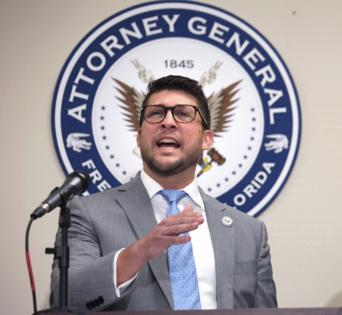Florida AG threatens Orlando Mayor Dyer with 'consequences' if city sticks with immigrant policy
Published in News & Features
ORLANDO, Fla. — Florida Attorney General James Uthmeier threatened “there will be consequences” for Orlando Mayor Buddy Dyer if the city continues to carry out its policy of barring employees and cops from inquiring about a law-abiding person’s immigration status.
In a letter to Dyer, posted to X, formerly Twitter, Monday evening, Uthmeier cited the so-called Trust Act enacted by the city in 2018, as “unlawful and, as of 2019 void.” He claimed the policy is a “sanctuary policy” and illegal under Florida law.
“This letter serves as notice that this office will take legal action against the City of Orlando and any city employee or agent thereof that violates chapter 908 of the Florida statutes,” says the letter, which refers to an April 7 city council meeting in which city officials including Dyer vowed to uphold the act.
In his post that included the letter, which tagged Dyer’s account, he said “there will be consequences” if the policy is followed, including possible “removal from office.”
Dyer could not immediately be reached Monday for comment on Uthmeier’s letter — though a city spokesperson said they are reviewing the letter.
The city’s Trust Act dates back to 2018, and was approved amid fears that residents would be hesitant to report crimes or serve as witnesses in investigations if they feared being deported. At the time, Commissioner Tony Ortiz, who led efforts to pass the policy, said he also feared undocumented immigrants being preyed upon by criminals who knew crimes wouldn’t be reported.
Ortiz, a Republican and retired Orlando Police Department officer, said Monday that the Trust Act isn’t a sanctuary policy, and doesn’t defy state and federal law.
“There’s nothing in no way shape or form that is meant to be rebellious against the federal government,” he said. “We’re not a sanctuary city.”
He said he worked on the policy seven years ago as a way to help with a problem he faced in his law enforcement career.
“One of the issues we had to deal with is there was a lot of violence committed against immigrants around the city and none of them would speak,” he said. “We were trying to get a path of communication from those who came here to work … for them to feel comfortable talking with law enforcement.”
State Rep. Anna Eskamani, D-Orlando, said she disagrees with Uthmeier that the policy violated state law, and said Uthmeier and the city should have a conversation to get “clarity.”
“I don’t believe what was a policy within OPD is breaking the law and I think it’s very important to provide clarity to what the Trust Act does and does not do,” said Eskamani, who plans to run for Orlando mayor in 2027. “Orlando needs to operate in the best interests of our constituents which are very diverse.”
The end of the policy reads: “Nothing in this policy shall be construed to prohibit any City of Orlando employee from cooperating with federal immigration authorities as such is required by state or federal law.”
Last week, immigrant advocates urged Dyer and city officials to back out of OPD’s cooperation agreement with ICE. The agreement was signed by Chief Eric Smith last month, and was discovered by advocates when it was posted to ICE’s website, alongside scores of others representing every county in Florida and numerous cities. That touched off a vigorous discussion at Orlando’s April 7 council meeting.
Dyer said that he disagreed with the law requiring the agreement, but also said he didn’t see it as optional. However, he vowed the city would still stick to its Trust Act — a declaration which seems to have incensed Uthmeier.
“We follow federal and state law,” he said. “We’ll still adhere to the Trust Act, which means that at a traffic stop, we’re not going to ask for documentation.”
----------
©2025 Orlando Sentinel. Visit at orlandosentinel.com. Distributed by Tribune Content Agency, LLC.







Comments